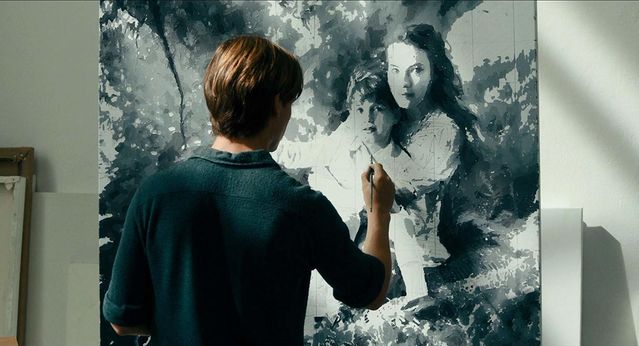Never Look Away
A film review by Lloyd I Sederer, MD

You don’t have to know the paintings or the aching life of the German artist, Gerhard Richter (1932-), to be riveted by its fictional telling in Never Look Away (the German original was titled Werk ohne Autor – Work Without Author).
If, however, you want to plumb an actual (and short) biographical essay on Richter you can find it in The New Yorker (“An Artist’s Life, Refracted In Film”, by Dana Goodyear, 14 January 2019).
In an early scene, we experience a frisson: we are witness to a Nazi rally. A stunning, Aryan woman is chosen, by an Officer, from a beaming collection of other young women. He hands her a bouquet of flowers which she is to present to the Führer as he passes by in parade.

She is Elisabeth (Saskia Rosendahl), aunt to a six-year old boy, Kurt (Cai Cohrs). His life becomes indelibly altered from her exposing him to modern art (and the freedom it urges) as well as her descent into psychosis. She soon is forcibly institutionalized by the Nazis, who then obliterate her fertility and then her life itself, in their crazed determination to rid the world of those affected by mental, intellectual or physical disability. Through their practice of euthanasia. This is an early phase of the genocide that went on to take the lives of six million Jews.
Echoing through the nightmarish catacombs of 20th century totalitarianism, we follow the Richter-inspired character, Kurt Barnert (Tom Schilling), as his life unfolds under the Nazis and then, in East Germany after the war, the Communists. It was only when he (and his wife) escape to West Germany, shortly before the Berlin Wall was constructed, that they first breathe the air of freedom.
Three phrases from the film reveal its central messages. First, is in its English title, “never look away”, a personal and moral message for the ages. To give combat to evil, neglect, abuse, the Holocaust, and too many other atrocities we must never look away – with its implicit urging of never forget, as well. Second, is an answer offered by Professor Carl Seeband (Sebastian Koch), whose upright and uptight presence commands the screen throughout the film: “because I can”. Which, of course, has two faces in that it can unleash goodness – or cruelty. Finally, there is the film’s German title, “Work without Author”, perhaps more figuratively expressed as “by an unknown author”. This cryptic title suggests not only that the artist does not want to be revealed, in his identity and intent, but that the author (painter) is, in fact, unknown to himself, a nameless vessel fated to carry the beauty and horror of both his and our universal experience.

Never Look Away blends a narrative of recovery from trauma with justice (kind of). It also is gloriously fueled by the love story between Kurt and his girlfriend, then wife, Ellie (Paula Beer). It is not possible to report on this film without giving away its central irony, which is that Ellie’s father is Professor Seeband, a renowned obstetrician/gynecologist and a high ranking SS Officer, who actively delivered on the Nazi’s sterilization and euthanasia mandates. It was he, as well, who further perpetrated his evil against his own daughter, as he knowingly and blindly continued to pursue the quest for a perfect bloodline. His privileged status continued under the Communists due to a twist of fate - or his talent for opportunism. He did not have to change his cast of mind to fit in.
The aesthetic story line belongs to Kurt. A gifted painter, he reaches majority under the Communists. Soon, he is painting Socialist Realism murals in 1950s Dresden, but his heart is not in it, the captivating work he produces notwithstanding. He is criticized by his art school teacher, who has arranged for his first major commission, as suffering from his ego, his narcissism, his “me, me, me”. Creative narcissism, not the material narcissism which has become a taint on our current times.
When Kurt and Ellie escape to the West, his creativity remains imprisoned. While Kurt’s creations in an art studio in West Berlin are initially vivid and engaging, they are absent of what the iconic director of the program (modeled after Joseph Beuys) calls his truth.
Kurt has yet to realize his artistic brilliance because he has yet to claim what has eluded him: the torment within and the identity it has fashioned. His true métier awaits him. It is only through what emerges on his canvases that he discovers the Professor’s enormous evil, banal as it usually is - as Hannah Arendt taught us. When truth emerges through his paintings, he is transformed into the artist he has endeavored to become. And, through his art, the moment of justice for the Professor, at least emotional justice, is achieved. Thus begins Kurt’s recovery from what he saw as a child (and did not look away), his years under totalitarian regimes and despotic figures, and finally the personal agonies perpetrated by his father-in-law.
The paintings used in this film, essential to its drama, by the way, are not Richter’s. They are nonetheless finely done, illuminated in their rendering, by Andreas Schön, who had been an assistant to Richter.
Never Look Away was written and directed by Florian Henckel von Donnersmarck. In 2006, he gave us The Lives of Others, for which he won an Oscar. That film had Sebastian Koch as well – but in that role he was a man under the grip of the Stasi, the East Berlin Ministry for State Security, rather than as an agent of the totalitarian state. This film runs over three hours. But time disappears when in the vortex of an incredible story so beautifully constructed and filmed. It may take you a bit of time to gain your balance and your senses after this film. It finds its way into your soul.
………………………….
Dr. Lloyd Sederer is a psychiatrist, public health doctor and medical journalist. His latest book, now in paperback, is The Addiction Solution: Treating Our Dependence on Opioids and Other Drugs (Scribner, 2018).


